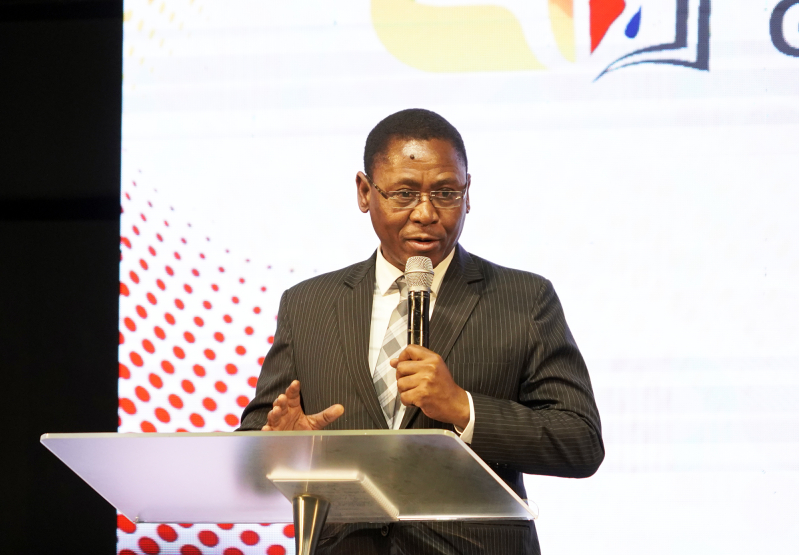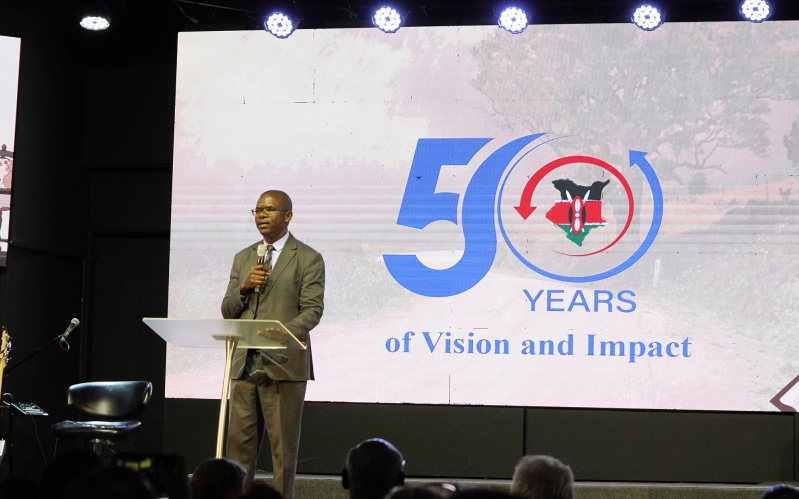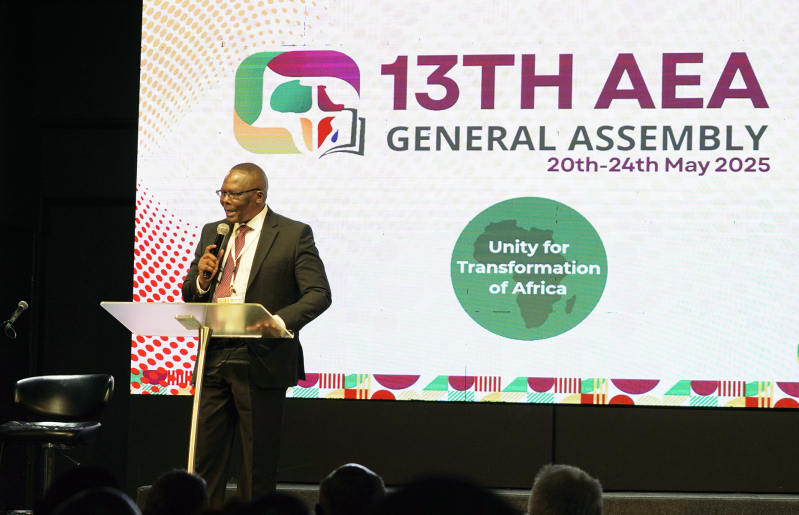
The 13th General Assembly of the Association of Evangelicals in Africa (AEA) officially opened Wednesday evening in Nairobi with a strong emphasis on unity among Christians across Africa. Hosted at the International Christian Center (ICC) and organized by the Evangelical Alliance of Kenya (EAK), the opening ceremony brought together church leaders, alliance representatives, and international partners from across the continent and beyond.
The theme of the General Assembly, “Unity for the Transformation of Africa,” was reflected throughout the program, with speakers highlighting the theological, demographic, and structural imperatives for evangelical cooperation across denominational, linguistic, and national lines.
Dr. Master Matlhaope, General Secretary of the AEA, addressed the assembly emphasizing that unity among evangelicals and Pentecostals is not only doctrinally sound but vital to Africa’s future.
“In Africa, evangelicals and Pentecostals are not separate categories. We are one family of believers, born again by the same Spirit,” Matlhaope said. “We must reject any attempts to divide us.”
Matlhaope also cited demographic data indicating that Africa is home to approximately 203 million Pentecostals and 198 million evangelicals, underscoring the collective size and influence of the movement on the continent. He urged leaders to ensure that their voice in public life reflects this numerical reality and advocated for strengthened cohesion and collaboration across Africa’s 54 countries. The AEA currently has active national alliances in 51 of them.
“The AEA is working toward full representation in all 54 countries,” he said, connecting this expansion to the AEA’s “Vision 2066” plan, which aims to support holistic transformation aligned with what the organization calls “the Africa God wants.”
Matlhaope warned against the divisive effects of language, geography, and political boundaries within the African Church. “We must not allow linguistic or cultural differences to fragment our witness,” he said, encouraging participants to see national alliances such as EAK as unifying platforms rather than controlling institutions.
Evangelical Alliance of Kenya marks 50 years
Rev. Kepha Nyandega, General Secretary of the Evangelical Alliance of Kenya, welcomed delegates to Nairobi and used the occasion to highlight EAK’s 50th anniversary. Founded in 1975, the alliance has served as a national body uniting evangelicals across denominational lines in Kenya.
“This is more than an anniversary. It is a testimony of God’s faithfulness and a moment of recommitment,” Nyandega said. “For five decades, EAK has worked to unify the body of Christ, speak prophetically into national affairs, and promote evangelical values.”

Nyandega identified several challenges facing the African Church today—including poverty, corruption, aging congregations, and limited missionary outreach—as obstacles that can only be addressed through greater unity.
Corruption, in particular, he described as “a spiritual cancer,” urging the Church not to remain complicit but to model integrity “from the pulpit to the people.”
Referencing demographic trends, he warned of an aging Church unable to keep pace with Africa’s youthful population. “Kenya’s average age is 19.8 years, yet most of our churches are over 30,” he said. “We must define new ways of addressing young people.”
Nyandega also reaffirmed the Alliance’s commitment to global missions, including reaching unreached people groups in Africa and beyond. “It is our time,” he said, “not just to send missionaries, but to be global in our witness—missions to the marketplace, to the public square, even reverse missions.”
He closed with a call for the assembly to be a turning point: “Let this not merely be an event, but a moment that ignites deeper partnerships, rekindles discipleship, and raises a stronger, united evangelical voice for the transformation of Africa.”
AEA President Dr. Goodwill Shana to conclude tenure
Rev. Dr. Goodwill Shana, who serves as both President of the AEA and Executive Chair of the World Evangelical Alliance’s International Council, also addressed the assembly. Shana is scheduled to conclude his eight-year term as AEA president on May 22, when a new leader will be elected during the General Assembly.
In his remarks, Shana reflected on the evolution of both the AEA and the Evangelical Alliance of Kenya. He recalled visiting Kenya decades ago when the evangelical movement in the country was less coordinated and praised the progress EAK has made since then.
“When I began coming to Kenya nearly 40 years ago, I was heartbroken to see the Church not as robust as it is now,” Shana said. “Today, I am encouraged by what I see. Unity is visible, and it is foundational.”
He described the General Assembly as a “kairos moment” — a time of divine significance — in which the AEA has the opportunity to reflect on its past, assess its present, and reposition itself for the future.

A major portion of Shana’s speech focused on the importance of transitions and transformations, both at the organizational and spiritual level. Drawing from biblical imagery, he likened the AEA’s current season to the wilderness journey of the Israelites.
“God led His people through transitions to prepare them for transformation. Sometimes it meant pitching and taking down tents daily. There was motion, change, and constant adjustment,” he said. “The AEA is in the midst of such a transition, and that is not something to fear. It is something to embrace.”
Shana underscored that transitions are not signs of instability but rather marks of growth when navigated prayerfully and intentionally. He expressed confidence that the upcoming leadership transition in the AEA would be marked by continuity and maturity.
“I am not worried about the future of the AEA,” he said. “It is in good hands—your hands. Look to the person next to you. It is leaders like you who will carry this movement forward.”
Shana emphasized that leadership transitions should not be merely procedural but transformative, renewing vision and strategy.
This transition, he noted, is not only about passing a baton but also about refreshing the AEA’s mission and building lasting relationships across regions.
“We often do well with structures but fall short with relationships,” Shana said. “This is the time to build not just systems, but trust. Real unity is when leaders can pick up the phone and say, ‘Let’s pray together. Let’s walk together.’”
He envisioned an AEA that can respond quickly to crises across the continent, citing recent events in several African countries as examples of where continental solidarity is urgently needed.
“If one nation suffers, we all should respond,” he said. “That is the type of unity that transforms.”
Shana also highlighted Kenya’s strategic importance within Africa’s evangelical landscape. As home to the AEA headquarters, Kenya is expected to serve not only as a host but also as a model for other national alliances.
“We cannot have a strong continental headquarters and a weak national alliance,” Shana said. “Kenya must continue to lead by example.”
He praised the current strength and cohesion within the EAK, noting its progress since earlier decades of internal division. “Today, the EAK stands strong. And that gives strength to the rest of Africa,” he said.
Unity as necessity for transformation
The General Assembly, which runs through May 24, features plenary sessions and strategic consultations addressing a wide range of topics, including theology, migration and persecution, ministry to children, the use of artificial intelligence in ministry, and other pressing issues facing the Church in Africa. Leaders from national alliances, parachurch organizations, and global networks are contributing to the conversations shaping the AEA’s vision for the years ahead.
Several speakers referred to Jesus’ prayer for unity in John 17:21 and framed the AEA’s mission as one grounded in both gospel proclamation and social transformation.
Throughout the evening, “unity” was presented not only as a theological value but also as a strategic necessity for confronting the continent’s challenges, including poverty, corruption, tribalism, and religious extremism.
Quoting the late Tanzanian president Julius Nyerere, Shana reminded the assembly that “division, tribalism, and disunity are the commanders-in-chief of Africa’s problems.”
“If we are going to solve the problems in Africa,” Shana said, “we have to make unity a premium. We must lay down our egos and agendas and answer the prayer of Jesus.”
As Shana prepares to hand over leadership, he expressed gratitude for his time in office. “Tomorrow is not a painful moment for me—it is a celebration,” he said. “I will step back, not with regret, but with confidence in what God will continue to do through this movement.”






